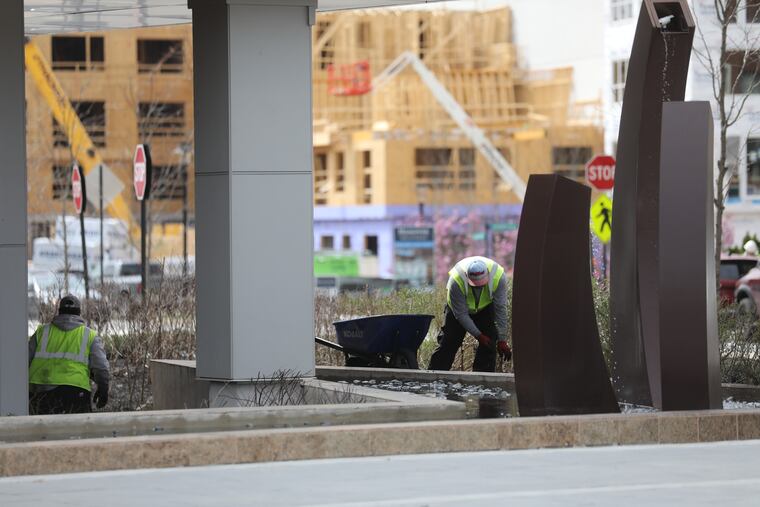Pa. bill would protect mom-and-pop subcontractors from construction errors they didn’t cause
For decades, general contractors have been able to require subcontractors and suppliers to assume all responsibility when an accident occurs. A new bill aims to protect some mom-and-pop construction businesses.

Any construction project requires many people: developers, engineers, architects, general contractors, demolition subcontractors, plumbers, and more. The National Association of Home Builders estimates that it takes, on average, 22 subcontractors to build a single-family home — a number that multiplies quickly with the scale of a project.
But when construction mishaps arise — during a job or after — having numerous people on-board presents a big question: Who is responsible?
It’s a question that arose during the 2013 Philadelphia building collapse that killed six people inside the Salvation Army Thrift Store. And it’s a question that a Fishtown family is grappling with after their property was irreparably damaged by a construction error in the rowhouse next door. Construction accidents, big or small, often result in finger-pointing, as lawyers and insurance companies try to determine who is at fault.
For decades in Pennsylvania, developers and general contractors have been able to require subcontractors and suppliers — such people as roofers and electricians — to assume all responsibility when an accident or injury occurs. That’s because Pennsylvania, unlike other states, has operated without a robust anti-indemnification law for the construction industry.
Practically, according to lawyers and subcontractors in the industry, that has meant that subcontractors looking for work are often faced with a tough choice: Sign a construction contract that agrees not to hold a project’s owner, general contractor, or others responsible for any damage that occurs — even if it was their fault — or walk away and risk losing out on a job.
“The reason we sign these contracts is because if I don’t sign, my competition will,” said Geoff Furtaw, co-owner of the Norristown-based Ceilings Inc., and president of the Interior Finish Contractors Association of the Delaware Valley, which is based in King of Prussia. “... From our perspective, everyone ought to be paying for their own experience.”
A bill proposed in Pennsylvania may soon help make that happen.
Last week, State Reps. Michael Driscoll (D., Phila.) and Todd Stephens (R., Montgomery) introduced a bill that would require parties to hold themselves responsible for the accidents and injuries they cause. According to the anti-indemnification bill, any contract that requires a subcontractor to hold another party harmless would be “unenforceable.”
Industry observers say that legislation like this makes the construction industry more fair — and could have big implications for mom-and-pop construction companies. Because smaller Pennsylvania subcontractors often have been required to accept liability for other parties’ negligence, their insurance costs are frequently higher. Any significant liability could put a small company out of business. Plus, the bill’s authors argue, higher insurance premiums typically mean higher construction costs — something that can be passed on to a consumer.
“We do think [this] will help the small-business owners on a lot of levels ... [and] will keep small businesses across the state on a level playing field,” Driscoll said in an interview.
Stephens said: “This is about fairness and accountability. It will ensure that those who are committing negligent acts are bearing financial responsibility for the damage they have caused, rather than passing that onto an innocent third party."
When that happens, Stephens continued, “There are legal costs that can skyrocket.”
The bipartisan bill, if passed when the legislative session resumes this fall, would join several dozen other states that prevent subcontractors from having to accept liability for another party’s negligence. Up until this point, Pennsylvania’s statute has offered protection to only architects, engineers, and surveyors in some circumstances.
The bill by Driscoll and Stephens, as it is written, does not clearly mention property owners and developers of construction projects, or whether the statute would apply to their contracts with the people and companies that work on their sites.
In interviews Monday, multiple construction and industry attorneys called the legislation significant — and something that could better hold the correct people accountable for their mistakes.
“You can’t contract away the responsibility for your own negligence anymore,” said Carter N. Williamson, a partner at Philadelphia-based Horn Williamson. “Everybody is responsible for their own negligence.”
In addition, the bill — if passed — could shift the power dynamic in the industry, said James Busenlener, a lawyer with experience in indemnity cases and the managing partner of Matthiesen, Wickert & Lehrer, S.C.’s New Orleans branch office.
“Most of the time, these [statutes] are enacted because legislatures are concerned that one party has too much power over one another,” Busenlener said. “There’s an inequity there.”
Representatives from two large general contracting companies based in Philadelphia did not return calls about the legislation. The bill so far has found support from multiple local and national subcontractor associations.